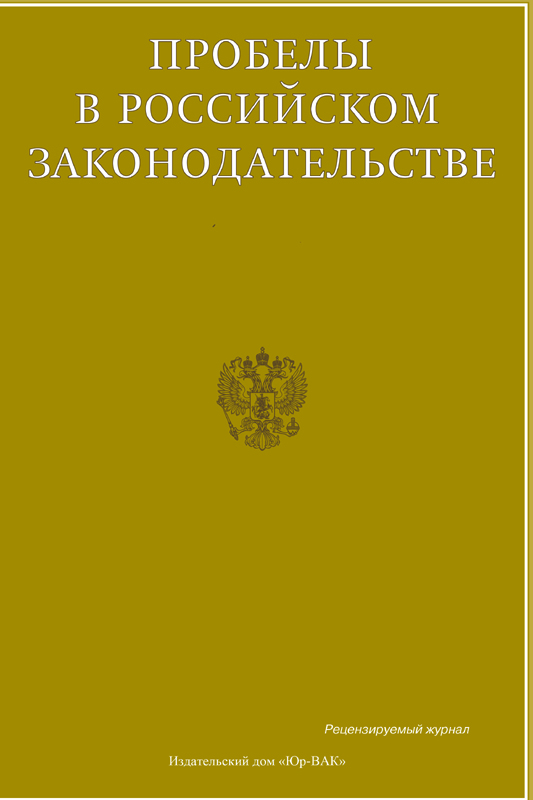On the Limits of the Use of Psycho-Physiological Research in the Investigation of Crimes
- 作者: Shkhagapsoev Z.L.1
-
隶属关系:
- North Caucasus Institute for Advanced Studies (branch) of the Krasnodar University of the Ministry of Internal Affairs of Russia
- 期: 卷 15, 编号 4 (2022)
- 页面: 19-23
- 栏目: Articles
- URL: https://journals.eco-vector.com/2072-3164/article/view/531498
- ID: 531498
如何引用文章
详细
Law enforcement agencies must constantly seek methods for detecting and investigating crimes. Of great importance is the possibility of conducting psychophysiological studies, in which, with the help of technical means, the reaction of the persons under study to information related to a specific criminal act is determined. The effectiveness of the use of these studies in investigative practice is significantly influenced by the level of professional competence of polygraph examiners, who study and evaluate in detail the reactions recorded by special devices, and formulate appropriate conclusions. Currently, in the Russian criminal procedure practice, a number of methods for conducting psychophysiological research using various technical means (polygraph, eye tracker, etc.) have been formulated. The purpose of the presented scientific work is to determine the limits of the use of psychophysiological research in the investigation of crimes. The author comes to the conclusion that the main limit of the use of psychophysiological studies is the impossibility of using their results as the only evidence in the case, since the state of the body of the person being studied and the professional competence of the polygraph examiner have a significant impact on the final data obtained. Attention is focused on the presence of problems that do not allow the full use of the potential of psychophysiological research in the investigation of crimes: the presence of gaps in legislative regulation; lack of a unified methodology for conducting psychophysiological studies; the presence of health restrictions for conducting a psychophysiological study, which are not always taken into account in practice; the vulnerability of the rights of the persons under study; the lack of a clear definition of the limits of the use of psychophysiological research in the Russian criminal process. The need for their prompt resolution is noted.
全文:
作者简介
Zaurbi Shkhagapsoev
North Caucasus Institute for Advanced Studies (branch) of the Krasnodar University of the Ministry of Internal Affairs of Russia
Email: lel4993@mail.ru
Dr.Sci.(Law), Professor, Police Colonel, Head Nalchik, Russia
参考
- Bessonov A.A., Borlakov Sh.V., Sokolov A.E. Prospects for the development of methods for assessing the reliability of information, taking into account the practice of using an electroencephalograph, polygraph and eyetracker // Investigation of crimes: problems and ways to solve them. 2021. No. 2 (32). pp. 89-93.
- Deulin D.V., Anikeeva N.V. Conducting special psychophysiological studies using a polygraph in the internal affairs bodies: a textbook. 2021. 116 p.
- Karagyozyan R.A. The relevance of the production of psychophysiological studies in the investigation of crimes // Issues of sustainable development of society. 2022. No. 4. S. 781-788.
- Maslov A.A., Belykh-Silaev D.V. Improving the training of polygraph examiners in the conditions of the information society // Public safety, law and order in the III millennium. 2021. No. 7-3. pp. 164-172.
- Mashkov S.A., Rodivilina V.A. Psychophysiological studies using a polygraph in order to identify the fact of hiding information. Shikanova. Irkutsk, 2021. S. 98-103.
- Ruling of the First Cassation Court of General Jurisdiction dated December 3, 2020 No. 77-2683/2020. The document has not been published. Access from SPS ConsultantPlus.
- Rudykh E.S., Nezhkina L.Yu. To the question of the tactics of conducting special psychophysiological studies using a polygraph of candidates for service in the Ministry of Internal Affairs of Russia // Scientific Digest of the East Siberian Institute of the Ministry of Internal Affairs of Russia. 2022. No. 1 (15). pp. 206-211.
- Svobodny F.K., Kuznetsov S.E. Implementation of video recording in the process of production of research using a polygraph // Investigation of crimes: problems and ways to solve them. 2021. No. 4 (34). pp. 82-86.
- Shaposhnikov A.A. Prospects for the use of artificial intelligence in the conduct of psychophysiological research // Bulletin of the St. Petersburg Military Institute of the National Guard Troops. 2022. No. 1 (18). pp. 29-32.
补充文件








